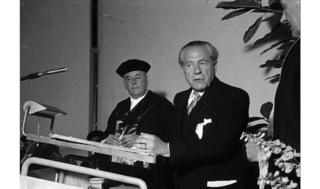
Peer Gynt is a five-act play in verse written in 1867 by the Norwegian dramatist Henrik Ibsen. It is one of Ibsen's best known and most widely performed plays.

Gottfried von Einem was an Austrian composer. He is known chiefly for his operas influenced by the music of Stravinsky and Prokofiev, as well as by jazz. He also composed pieces for piano, violin and organ.
Peer Gynt is a play by Henrik Ibsen named for its main character, based on the fairy tale Per Gynt.
Werner Egk, born Werner Joseph Mayer, was a German composer.

Rolf Liebermann, was a Swiss composer and music administrator. He served as the Artistic Director of the Hamburg State Opera from 1959 to 1973 and again from 1985 to 1988. He was also Artistic Director of the Paris Opera from 1973 to 1980.
Jack Hamilton Beeson was an American composer. He was known particularly for his operas, the best known of which are Lizzie Borden, Hello Out There!, and The Sweet Bye and Bye.
Herbert Janssen was a leading German operatic baritone of the 20th century who had a career in Europe and the United States.
Hans Vogt was a German composer and conductor.
Die Zaubergeige is a 1935 opera by Werner Egk to a libretto by Ludwig Strecker after Count Franz Pocci. Egk revised the opera in 1954.
Die Verlobung in San Domingo is a 1960 opera by Werner Egk after Heinrich von Kleist, premiered on 22 November 1963 at the Bavarian State Opera.
Irische Legende is a 1955 opera by Werner Egk who also wrote the libretto after the 1892/1899 verse drama The Countess Cathleen by W. B. Yeats. It premiered at the Salzburg Festival on 17 August 1955.
Columbus is a 1933 opera by Werner Egk. Originally a radio opera, Egk revised it in 1942 for the stage. The Munich premiere was acclaimed in the press and joined the year's repertoire at the Freiburg Theatre, though some dissented. The lack of melody in the opera brought negative comment from Richard Strauss in comparison to Meyerbeer's grand opera on the life of the Portuguese explorer Vasco da Gama L'Africaine.
Circe is a 1945 opera by Werner Egk after Pedro Calderón de la Barca, premiered 1948. Egk reworked it as an opera semibuffa as 17 Tage und 4 Minuten, 1966.
Juan Allende-Blin is a Chilean composer and academic teacher who lives in Germany.
Dorothea Chryst, also Dorli-Maria Chryst is a German operatic and operetta soprano.

Mathieu Karl Maria Ahlersmeyer was a German operatic baritone and actor.

Ludwig Strecker Jr., also Ludwig Strecker der Jüngere, was a German music publisher and an author of opera librettos which he wrote under the pen name Ludwig Andersen. He authored, and published through the Schott Music publishing house, two of the most successful German contemporary operas of the 1930s, Egk's Die Zaubergeige and Reutter's Doktor Johannes Faust.
Roland Hermann was a German operatic baritone and former professor at the Hochschule für Musik Karlsruhe. A member of the Opernhaus Zürich, he performed leading roles internationally, not only in standard repertoire but also in world premieres and rarely performed works, such as Schoenberg's Moses und Aron.
Hedwig Hillengaß was a German operatic soprano, who appeared in leading roles, first operetta, later opera, in Germany. In May 1936, Bizet's Carmen was broadcast with her in the title role. Besides the standard repertoire, she performed in the world premiere of Egk's Peer Gynt, and the German premiere of Jakov Gotovac's Ero s onoga svijeta.
Hilde Scheppan was a German operatic soprano and academic teacher. She was engaged for 20 years at the Staatsoper Unter den Linden in Berlin and made guest appearances at the Bayreuth Festival from 1937 to 1958. She performed roles in Wagner's stage works in productions by Heinz Tietjen both in Berlin and Bayreuth. After World War II, she first continued work in Berlin, but then moved to the Staatsoper Stuttgart. She taught as a professor of voice at the Hochschule für Musik Nürnberg and the Musikhochschule München.




